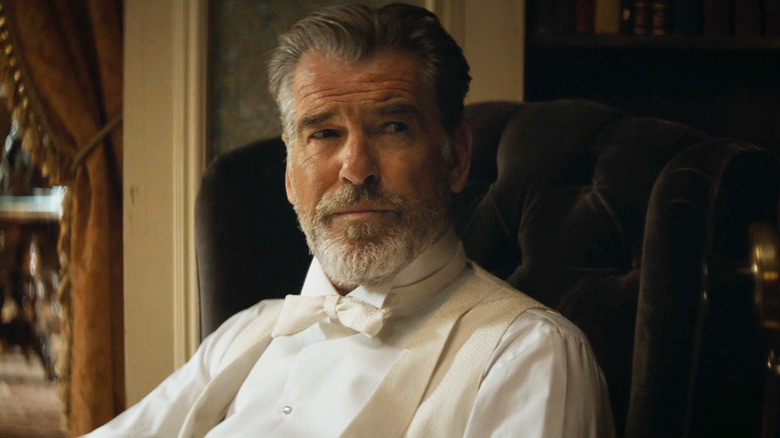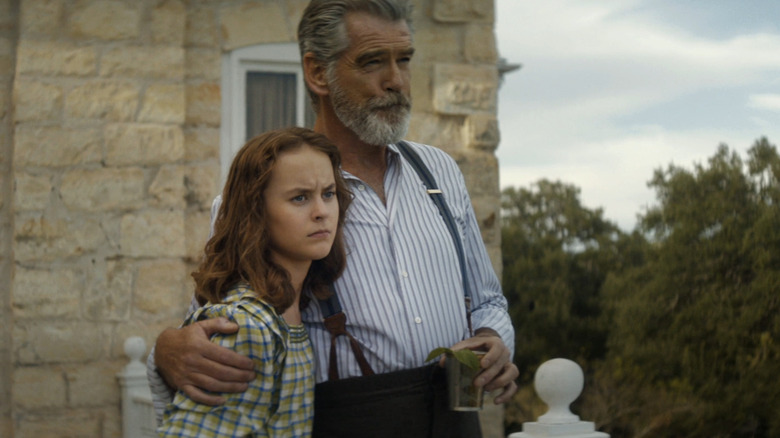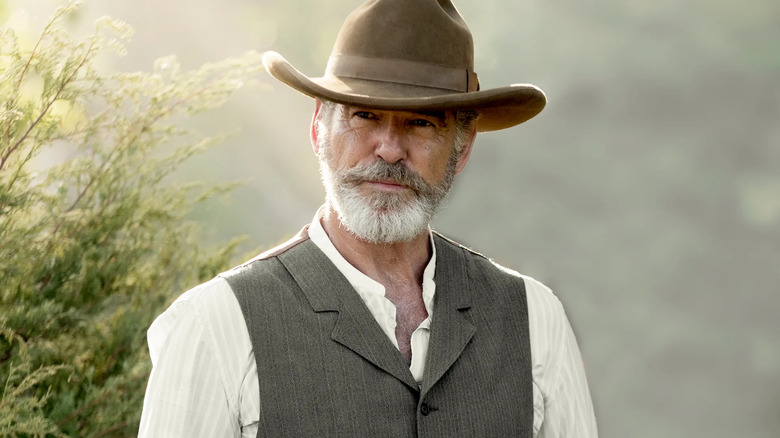This Overlooked Pierce Brosnan Western Series Should Have Never Been Canceled
In the Taylor Sheridan-created Western series "The Last Cowboy" (which you've probably never heard of), contestants compete for a place in the "Run for a Million" competition. Created by Sheridan and his business partner Amanda Brumley, the official site of the event states that it and the TV show are designed to "celebrate the growth of the Western lifestyle." That growth is arguably almost entirely the result of Sheridan's own efforts. The man has created a sprawling TV empire at the head of which sits "Yellowstone," the popular neo Western series which ended with its fifth and controversial final season in 2024. But while it may have ended, "Yellowstone" leaves an entirely new TV landscape in its wake, one in which that "Western lifestyle" has much more appeal than it did in a pre-"Yellowstone" world.
That is to say that Sheridan has almost single-handedly ushered in a new age of Western entertainment. To be sure, the genre itself will likely never achieve the same kind of appeal and cultural sway that it wielded back in the early 20th century. Since the 1970s, when the Western has really fell out of favor, and has struggled to regain any sort of popularity. That's not to say there haven't been some excellent and in some cases truly seminal Westerns released since then, Clint Eastwood's "Unforgiven" being one example. Even in the last decade, we've seen some great Westerns, but overall oaters just can't compete with the age of superheroes, video games, and streaming.
Sheridan ushering in a new age of Western appreciation, then, isn't insignificant. While it doesn't mean the genre is suddenly thriving again, clearly there is a growing appetite for this kind of entertainment, even if you just look at other streamers desperately trying to capitalize on the "Yellowstone" hype with Western series "American Primeval" and "Ransom Canyon," which recently dominated the Netflix chart. It's a shame, then, that Pierce Brosnan and his Western drama series "The Son" just missed out on this renewed interest in what otherwise seemed like a long dead genre.
The Son was the kind of show that might have thrived today
Based on Philipp Meyer's 2013 novel of the same name, "The Son" was created and developed by Meyer alongside Brian McGreevy, creator of Netflix's "Hemlock Grove" and author of the novel on which it was based, and Lee Shipman, who also wrote on "Hemlock Grove." Like the book, the AMC series — which debuted on April 8, 2017 — is a multi-generational epic primarily focused on Pierce Brosnan's Eli McCullough. As teenagers, Eli and his brother, Martin, are kidnapped by Comanches, who eventually kill Martin and raise Eli within their tribe. In the "present day" storyline, set in 1915 Texas, Eli has become an influential and ruthless cattle baron who's venturing into the oil business, with the aim of passing on an oil empire to his sons and grandchildren. But the fledgling enterprise is under threat from thieves and those who seek to sabotage Eli, and puts him in direct conflict with his Spanish neighbor, Pedro Garcia (Carlos Bardem), forcing him to fight for his land, family, and future.
The first season cuts back and forth between the 1849 and 1915 storylines, providing a comprehensive overview of Eli's life, his transformation into a ruthless killer under the guidance of Comanche war chief Toshaway, and his eventual rise to power in "modern day" Texas. In a wider sense, the show charts the story of America becoming a global superpower through the lens of Eli's oil empire.
Season 2 gave viewers an even more wide-ranging depiction of the McCullough dynasty, introducing a 1988 timeline that followed an elderly Jeannie McCullough (Lois Smith), Eli's granddaughter. We also saw more of a young Eli in the year 1852, where he leads a Comanche raid into Mexico, and in the 1915 timeline the McCullough family continues to face major threats to their expanding oil business. By the end of the second season, then, we essentially had "Yellowstone" and its various spin-offs contained within one show. Rather than tracking the travails of a powerful family in separate series, "The Son" attempted to do so within one show, and while it was an ambitious and impressive attempt, it ultimately received lackluster reviews and was canceled after two seasons on June 29, 2019. Had it run during this new era of Western revivalism, however, we might well have seen more of Brosnan's oil baron.
The Son couldn't wrangle enough hype in a pre-Yellowstone world
Viewed in retrospect, "The Son" sort of feels like a proto-"Yellowstone" that debuted too soon. At the very least, it certainly seems like the kind of show that has cropped up in the wake of Taylor Sheridan's uber-popular neo Western. While Taylor Kitsch's brutal new Western series dominates the Netflix charts and streamers continue to try to emulate the success of "Yellowstone," we're left to wonder what could have been had "The Son" been given the chance to tell its sprawling multi-generational tale at a time when this sort of thing looks to be enjoying a surge in popularity.
That said, the reviews didn't exactly inspire much confidence. There's no doubt that Pierce Brosnan was characteristically brilliant in the lead role, balancing an infectious charisma with a frankly alarming ruthlessness that he also showcased in the recent "MobLand" — another show focused on a corrupt dynasty that's actually a great replacement for "Yellowstone" itself. Otherwise, however, "The Son" received some harsh reviews for its slow pacing. Still many critics did like the series, but even with those positive reviews the show could only manage a distinctly average 52% score on Rotten Tomatoes.
It might not go down as one of the best Western series ever, then, but "The Son" is definitely worth a watch for fans of modern Western tales with all the attendant production sheen of an AMC series, or merely for fans of Brosnan, who does great work in a show that might not always live up to his performance but which often feels like it could have if it were given more time.


